Comprehensive Report: Performance and Reward Management Strategies
VerifiedAdded on 2019/10/01
|14
|3263
|149
Report
AI Summary
This report provides a comprehensive overview of performance and reward management. It begins by defining the purpose of performance management and its relationship to business objectives, emphasizing its role in achieving organizational success through effective employee management. The report then delves into the key components of performance management, including goal setting, learning and development, feedback, and ongoing conversations, and explains how these components influence staff motivation. It clarifies the purpose of rewards within a performance management system, highlighting the importance of recognizing and appreciating employee contributions to enhance motivation and reduce turnover. The report explores the components of an effective total reward system, linking it to performance management through financial and non-financial rewards, which are crucial for employee retention and attraction. Finally, the report identifies and explains five key factors for managing performance, such as change management, operational focus, infrastructure, correct metrics, and accountability. The report also describes the various data needed for performance and reward management systems, providing a well-rounded analysis of the subject.
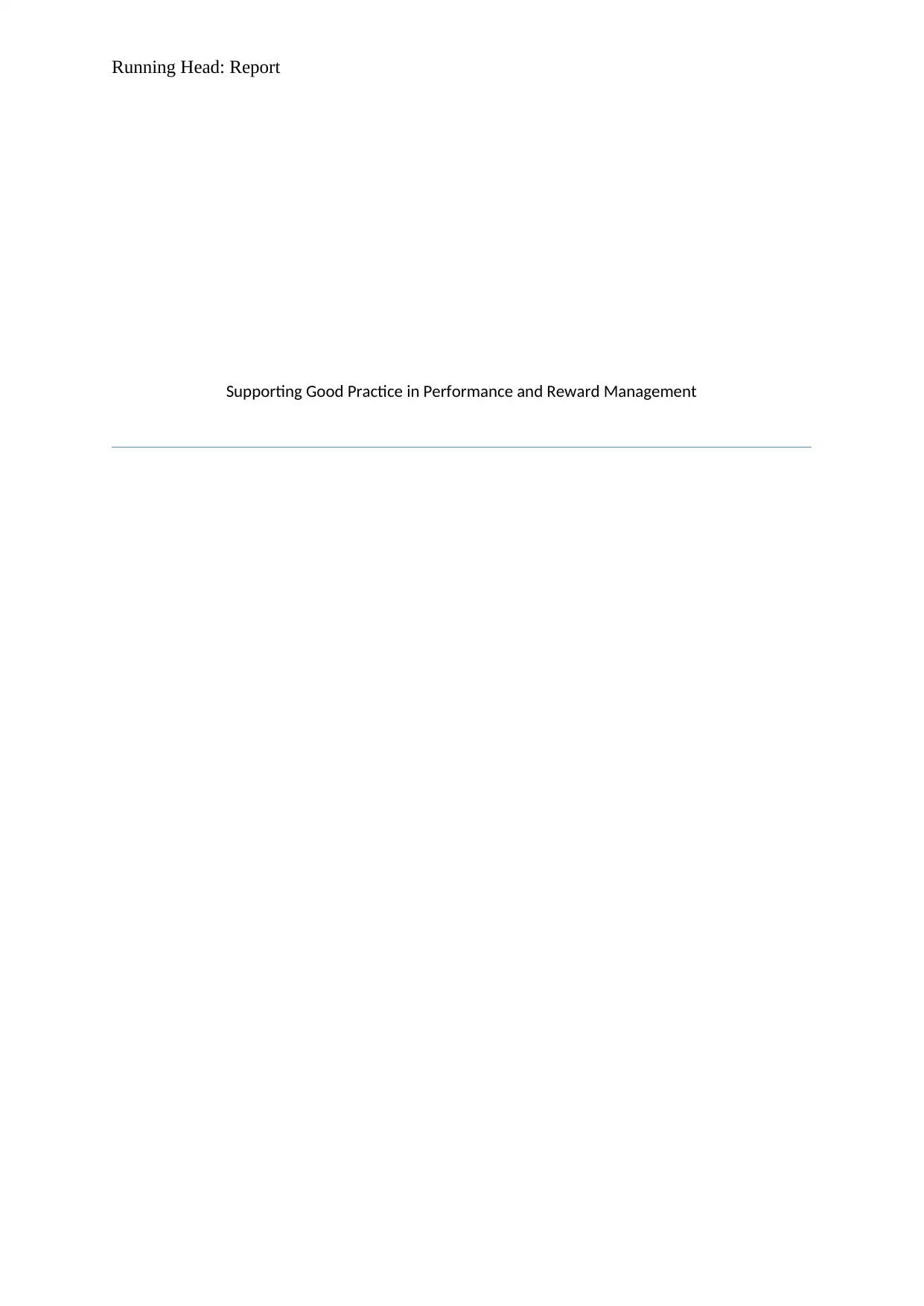
Running Head: Report
Supporting Good Practice in Performance and Reward Management
Supporting Good Practice in Performance and Reward Management
Paraphrase This Document
Need a fresh take? Get an instant paraphrase of this document with our AI Paraphraser
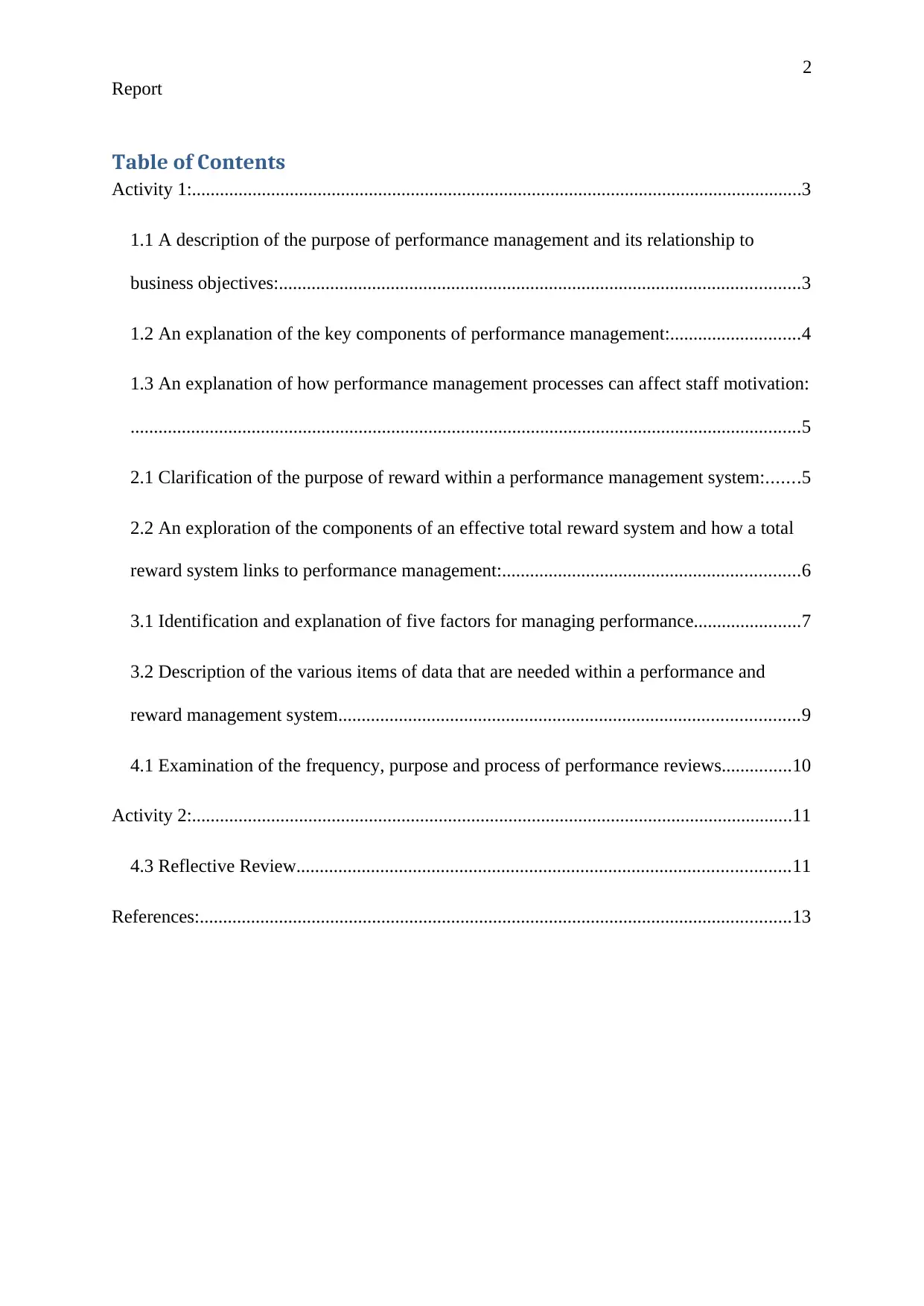
2
Report
Table of Contents
Activity 1:...................................................................................................................................3
1.1 A description of the purpose of performance management and its relationship to
business objectives:................................................................................................................3
1.2 An explanation of the key components of performance management:............................4
1.3 An explanation of how performance management processes can affect staff motivation:
................................................................................................................................................5
2.1 Clarification of the purpose of reward within a performance management system:.......5
2.2 An exploration of the components of an effective total reward system and how a total
reward system links to performance management:................................................................6
3.1 Identification and explanation of five factors for managing performance.......................7
3.2 Description of the various items of data that are needed within a performance and
reward management system...................................................................................................9
4.1 Examination of the frequency, purpose and process of performance reviews...............10
Activity 2:.................................................................................................................................11
4.3 Reflective Review..........................................................................................................11
References:...............................................................................................................................13
Report
Table of Contents
Activity 1:...................................................................................................................................3
1.1 A description of the purpose of performance management and its relationship to
business objectives:................................................................................................................3
1.2 An explanation of the key components of performance management:............................4
1.3 An explanation of how performance management processes can affect staff motivation:
................................................................................................................................................5
2.1 Clarification of the purpose of reward within a performance management system:.......5
2.2 An exploration of the components of an effective total reward system and how a total
reward system links to performance management:................................................................6
3.1 Identification and explanation of five factors for managing performance.......................7
3.2 Description of the various items of data that are needed within a performance and
reward management system...................................................................................................9
4.1 Examination of the frequency, purpose and process of performance reviews...............10
Activity 2:.................................................................................................................................11
4.3 Reflective Review..........................................................................................................11
References:...............................................................................................................................13
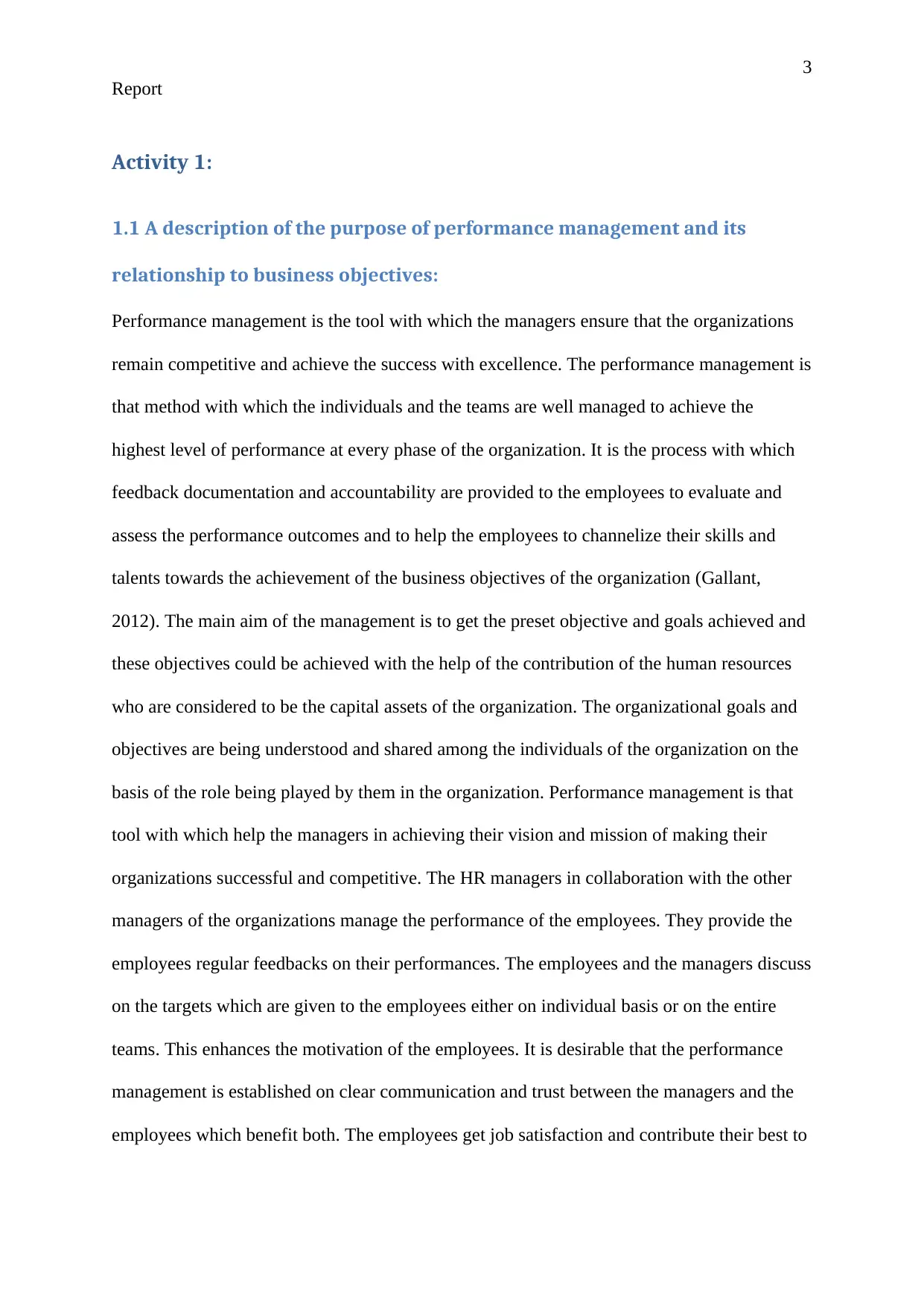
3
Report
Activity 1:
1.1 A description of the purpose of performance management and its
relationship to business objectives:
Performance management is the tool with which the managers ensure that the organizations
remain competitive and achieve the success with excellence. The performance management is
that method with which the individuals and the teams are well managed to achieve the
highest level of performance at every phase of the organization. It is the process with which
feedback documentation and accountability are provided to the employees to evaluate and
assess the performance outcomes and to help the employees to channelize their skills and
talents towards the achievement of the business objectives of the organization (Gallant,
2012). The main aim of the management is to get the preset objective and goals achieved and
these objectives could be achieved with the help of the contribution of the human resources
who are considered to be the capital assets of the organization. The organizational goals and
objectives are being understood and shared among the individuals of the organization on the
basis of the role being played by them in the organization. Performance management is that
tool with which help the managers in achieving their vision and mission of making their
organizations successful and competitive. The HR managers in collaboration with the other
managers of the organizations manage the performance of the employees. They provide the
employees regular feedbacks on their performances. The employees and the managers discuss
on the targets which are given to the employees either on individual basis or on the entire
teams. This enhances the motivation of the employees. It is desirable that the performance
management is established on clear communication and trust between the managers and the
employees which benefit both. The employees get job satisfaction and contribute their best to
Report
Activity 1:
1.1 A description of the purpose of performance management and its
relationship to business objectives:
Performance management is the tool with which the managers ensure that the organizations
remain competitive and achieve the success with excellence. The performance management is
that method with which the individuals and the teams are well managed to achieve the
highest level of performance at every phase of the organization. It is the process with which
feedback documentation and accountability are provided to the employees to evaluate and
assess the performance outcomes and to help the employees to channelize their skills and
talents towards the achievement of the business objectives of the organization (Gallant,
2012). The main aim of the management is to get the preset objective and goals achieved and
these objectives could be achieved with the help of the contribution of the human resources
who are considered to be the capital assets of the organization. The organizational goals and
objectives are being understood and shared among the individuals of the organization on the
basis of the role being played by them in the organization. Performance management is that
tool with which help the managers in achieving their vision and mission of making their
organizations successful and competitive. The HR managers in collaboration with the other
managers of the organizations manage the performance of the employees. They provide the
employees regular feedbacks on their performances. The employees and the managers discuss
on the targets which are given to the employees either on individual basis or on the entire
teams. This enhances the motivation of the employees. It is desirable that the performance
management is established on clear communication and trust between the managers and the
employees which benefit both. The employees get job satisfaction and contribute their best to
⊘ This is a preview!⊘
Do you want full access?
Subscribe today to unlock all pages.

Trusted by 1+ million students worldwide
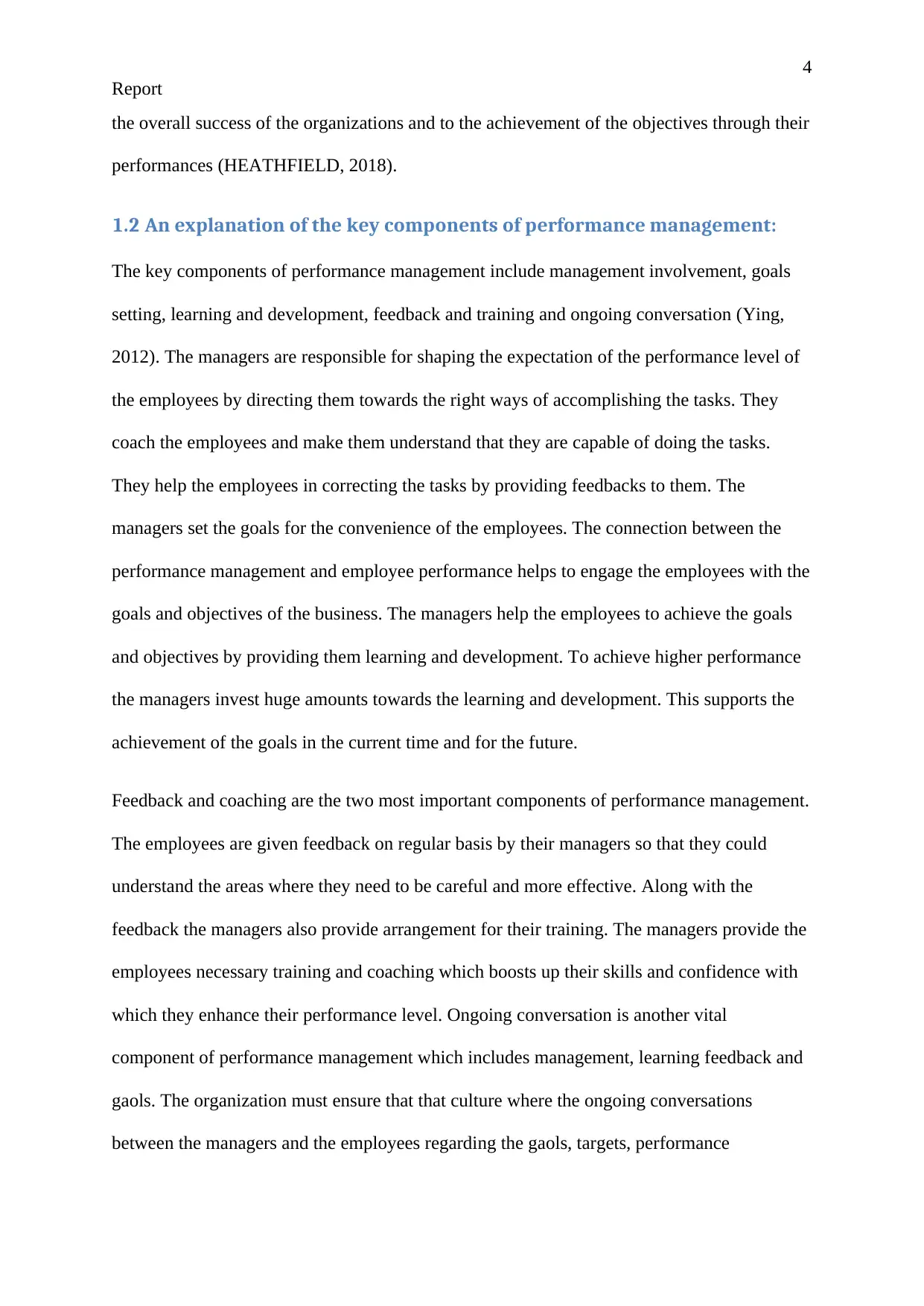
4
Report
the overall success of the organizations and to the achievement of the objectives through their
performances (HEATHFIELD, 2018).
1.2 An explanation of the key components of performance management:
The key components of performance management include management involvement, goals
setting, learning and development, feedback and training and ongoing conversation (Ying,
2012). The managers are responsible for shaping the expectation of the performance level of
the employees by directing them towards the right ways of accomplishing the tasks. They
coach the employees and make them understand that they are capable of doing the tasks.
They help the employees in correcting the tasks by providing feedbacks to them. The
managers set the goals for the convenience of the employees. The connection between the
performance management and employee performance helps to engage the employees with the
goals and objectives of the business. The managers help the employees to achieve the goals
and objectives by providing them learning and development. To achieve higher performance
the managers invest huge amounts towards the learning and development. This supports the
achievement of the goals in the current time and for the future.
Feedback and coaching are the two most important components of performance management.
The employees are given feedback on regular basis by their managers so that they could
understand the areas where they need to be careful and more effective. Along with the
feedback the managers also provide arrangement for their training. The managers provide the
employees necessary training and coaching which boosts up their skills and confidence with
which they enhance their performance level. Ongoing conversation is another vital
component of performance management which includes management, learning feedback and
gaols. The organization must ensure that that culture where the ongoing conversations
between the managers and the employees regarding the gaols, targets, performance
Report
the overall success of the organizations and to the achievement of the objectives through their
performances (HEATHFIELD, 2018).
1.2 An explanation of the key components of performance management:
The key components of performance management include management involvement, goals
setting, learning and development, feedback and training and ongoing conversation (Ying,
2012). The managers are responsible for shaping the expectation of the performance level of
the employees by directing them towards the right ways of accomplishing the tasks. They
coach the employees and make them understand that they are capable of doing the tasks.
They help the employees in correcting the tasks by providing feedbacks to them. The
managers set the goals for the convenience of the employees. The connection between the
performance management and employee performance helps to engage the employees with the
goals and objectives of the business. The managers help the employees to achieve the goals
and objectives by providing them learning and development. To achieve higher performance
the managers invest huge amounts towards the learning and development. This supports the
achievement of the goals in the current time and for the future.
Feedback and coaching are the two most important components of performance management.
The employees are given feedback on regular basis by their managers so that they could
understand the areas where they need to be careful and more effective. Along with the
feedback the managers also provide arrangement for their training. The managers provide the
employees necessary training and coaching which boosts up their skills and confidence with
which they enhance their performance level. Ongoing conversation is another vital
component of performance management which includes management, learning feedback and
gaols. The organization must ensure that that culture where the ongoing conversations
between the managers and the employees regarding the gaols, targets, performance
Paraphrase This Document
Need a fresh take? Get an instant paraphrase of this document with our AI Paraphraser
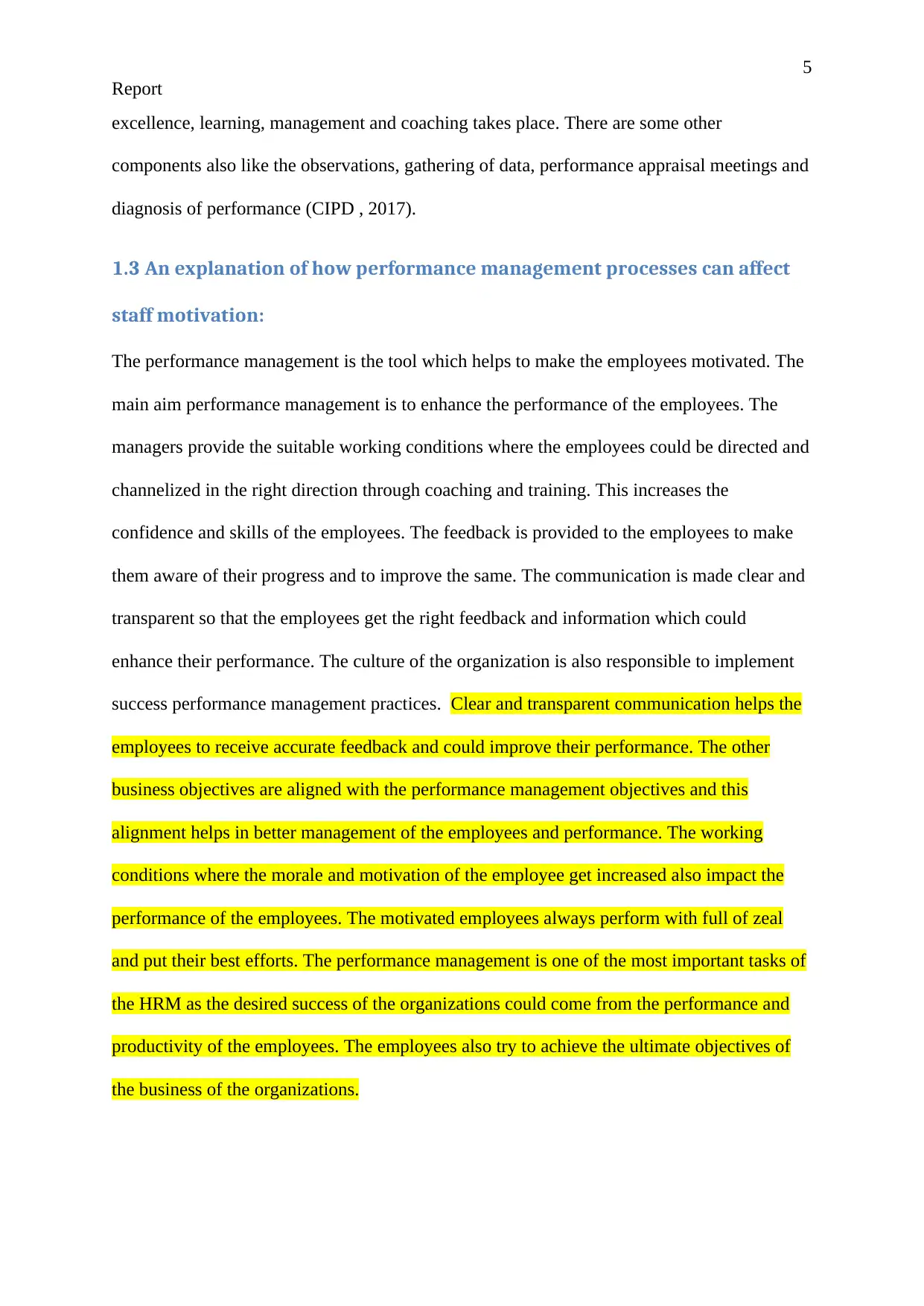
5
Report
excellence, learning, management and coaching takes place. There are some other
components also like the observations, gathering of data, performance appraisal meetings and
diagnosis of performance (CIPD , 2017).
1.3 An explanation of how performance management processes can affect
staff motivation:
The performance management is the tool which helps to make the employees motivated. The
main aim performance management is to enhance the performance of the employees. The
managers provide the suitable working conditions where the employees could be directed and
channelized in the right direction through coaching and training. This increases the
confidence and skills of the employees. The feedback is provided to the employees to make
them aware of their progress and to improve the same. The communication is made clear and
transparent so that the employees get the right feedback and information which could
enhance their performance. The culture of the organization is also responsible to implement
success performance management practices. Clear and transparent communication helps the
employees to receive accurate feedback and could improve their performance. The other
business objectives are aligned with the performance management objectives and this
alignment helps in better management of the employees and performance. The working
conditions where the morale and motivation of the employee get increased also impact the
performance of the employees. The motivated employees always perform with full of zeal
and put their best efforts. The performance management is one of the most important tasks of
the HRM as the desired success of the organizations could come from the performance and
productivity of the employees. The employees also try to achieve the ultimate objectives of
the business of the organizations.
Report
excellence, learning, management and coaching takes place. There are some other
components also like the observations, gathering of data, performance appraisal meetings and
diagnosis of performance (CIPD , 2017).
1.3 An explanation of how performance management processes can affect
staff motivation:
The performance management is the tool which helps to make the employees motivated. The
main aim performance management is to enhance the performance of the employees. The
managers provide the suitable working conditions where the employees could be directed and
channelized in the right direction through coaching and training. This increases the
confidence and skills of the employees. The feedback is provided to the employees to make
them aware of their progress and to improve the same. The communication is made clear and
transparent so that the employees get the right feedback and information which could
enhance their performance. The culture of the organization is also responsible to implement
success performance management practices. Clear and transparent communication helps the
employees to receive accurate feedback and could improve their performance. The other
business objectives are aligned with the performance management objectives and this
alignment helps in better management of the employees and performance. The working
conditions where the morale and motivation of the employee get increased also impact the
performance of the employees. The motivated employees always perform with full of zeal
and put their best efforts. The performance management is one of the most important tasks of
the HRM as the desired success of the organizations could come from the performance and
productivity of the employees. The employees also try to achieve the ultimate objectives of
the business of the organizations.
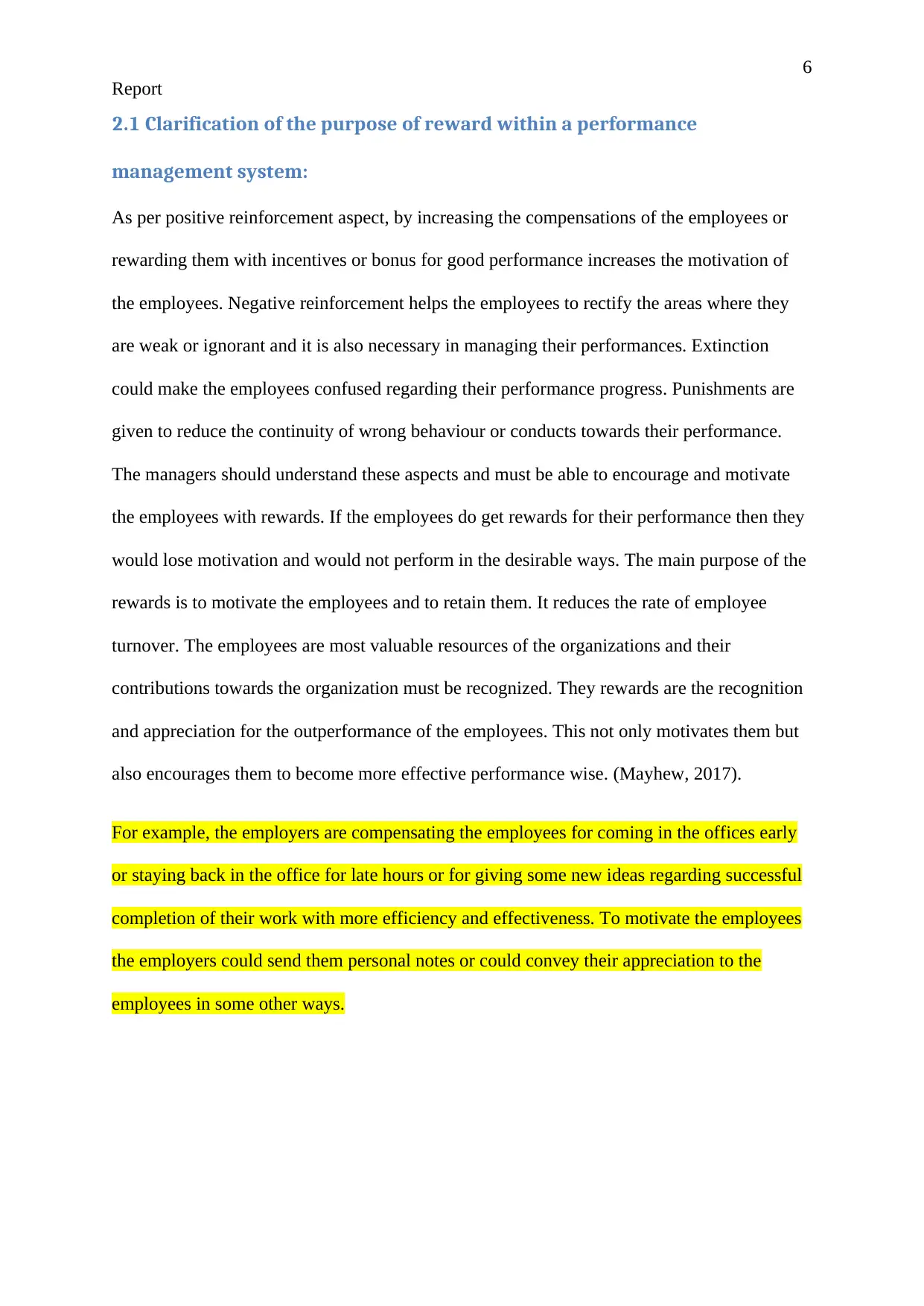
6
Report
2.1 Clarification of the purpose of reward within a performance
management system:
As per positive reinforcement aspect, by increasing the compensations of the employees or
rewarding them with incentives or bonus for good performance increases the motivation of
the employees. Negative reinforcement helps the employees to rectify the areas where they
are weak or ignorant and it is also necessary in managing their performances. Extinction
could make the employees confused regarding their performance progress. Punishments are
given to reduce the continuity of wrong behaviour or conducts towards their performance.
The managers should understand these aspects and must be able to encourage and motivate
the employees with rewards. If the employees do get rewards for their performance then they
would lose motivation and would not perform in the desirable ways. The main purpose of the
rewards is to motivate the employees and to retain them. It reduces the rate of employee
turnover. The employees are most valuable resources of the organizations and their
contributions towards the organization must be recognized. They rewards are the recognition
and appreciation for the outperformance of the employees. This not only motivates them but
also encourages them to become more effective performance wise. (Mayhew, 2017).
For example, the employers are compensating the employees for coming in the offices early
or staying back in the office for late hours or for giving some new ideas regarding successful
completion of their work with more efficiency and effectiveness. To motivate the employees
the employers could send them personal notes or could convey their appreciation to the
employees in some other ways.
Report
2.1 Clarification of the purpose of reward within a performance
management system:
As per positive reinforcement aspect, by increasing the compensations of the employees or
rewarding them with incentives or bonus for good performance increases the motivation of
the employees. Negative reinforcement helps the employees to rectify the areas where they
are weak or ignorant and it is also necessary in managing their performances. Extinction
could make the employees confused regarding their performance progress. Punishments are
given to reduce the continuity of wrong behaviour or conducts towards their performance.
The managers should understand these aspects and must be able to encourage and motivate
the employees with rewards. If the employees do get rewards for their performance then they
would lose motivation and would not perform in the desirable ways. The main purpose of the
rewards is to motivate the employees and to retain them. It reduces the rate of employee
turnover. The employees are most valuable resources of the organizations and their
contributions towards the organization must be recognized. They rewards are the recognition
and appreciation for the outperformance of the employees. This not only motivates them but
also encourages them to become more effective performance wise. (Mayhew, 2017).
For example, the employers are compensating the employees for coming in the offices early
or staying back in the office for late hours or for giving some new ideas regarding successful
completion of their work with more efficiency and effectiveness. To motivate the employees
the employers could send them personal notes or could convey their appreciation to the
employees in some other ways.
⊘ This is a preview!⊘
Do you want full access?
Subscribe today to unlock all pages.

Trusted by 1+ million students worldwide
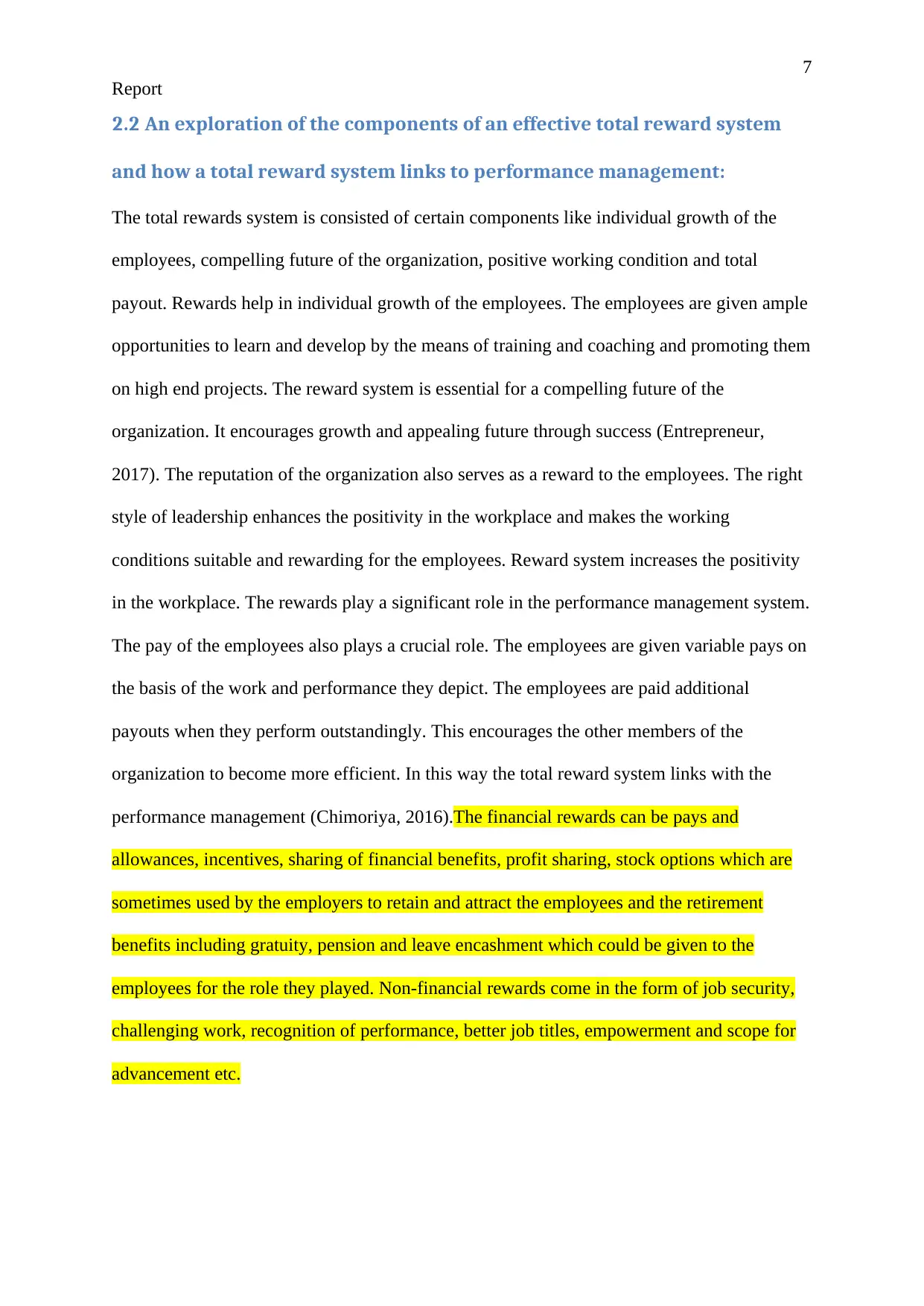
7
Report
2.2 An exploration of the components of an effective total reward system
and how a total reward system links to performance management:
The total rewards system is consisted of certain components like individual growth of the
employees, compelling future of the organization, positive working condition and total
payout. Rewards help in individual growth of the employees. The employees are given ample
opportunities to learn and develop by the means of training and coaching and promoting them
on high end projects. The reward system is essential for a compelling future of the
organization. It encourages growth and appealing future through success (Entrepreneur,
2017). The reputation of the organization also serves as a reward to the employees. The right
style of leadership enhances the positivity in the workplace and makes the working
conditions suitable and rewarding for the employees. Reward system increases the positivity
in the workplace. The rewards play a significant role in the performance management system.
The pay of the employees also plays a crucial role. The employees are given variable pays on
the basis of the work and performance they depict. The employees are paid additional
payouts when they perform outstandingly. This encourages the other members of the
organization to become more efficient. In this way the total reward system links with the
performance management (Chimoriya, 2016).The financial rewards can be pays and
allowances, incentives, sharing of financial benefits, profit sharing, stock options which are
sometimes used by the employers to retain and attract the employees and the retirement
benefits including gratuity, pension and leave encashment which could be given to the
employees for the role they played. Non-financial rewards come in the form of job security,
challenging work, recognition of performance, better job titles, empowerment and scope for
advancement etc.
Report
2.2 An exploration of the components of an effective total reward system
and how a total reward system links to performance management:
The total rewards system is consisted of certain components like individual growth of the
employees, compelling future of the organization, positive working condition and total
payout. Rewards help in individual growth of the employees. The employees are given ample
opportunities to learn and develop by the means of training and coaching and promoting them
on high end projects. The reward system is essential for a compelling future of the
organization. It encourages growth and appealing future through success (Entrepreneur,
2017). The reputation of the organization also serves as a reward to the employees. The right
style of leadership enhances the positivity in the workplace and makes the working
conditions suitable and rewarding for the employees. Reward system increases the positivity
in the workplace. The rewards play a significant role in the performance management system.
The pay of the employees also plays a crucial role. The employees are given variable pays on
the basis of the work and performance they depict. The employees are paid additional
payouts when they perform outstandingly. This encourages the other members of the
organization to become more efficient. In this way the total reward system links with the
performance management (Chimoriya, 2016).The financial rewards can be pays and
allowances, incentives, sharing of financial benefits, profit sharing, stock options which are
sometimes used by the employers to retain and attract the employees and the retirement
benefits including gratuity, pension and leave encashment which could be given to the
employees for the role they played. Non-financial rewards come in the form of job security,
challenging work, recognition of performance, better job titles, empowerment and scope for
advancement etc.
Paraphrase This Document
Need a fresh take? Get an instant paraphrase of this document with our AI Paraphraser
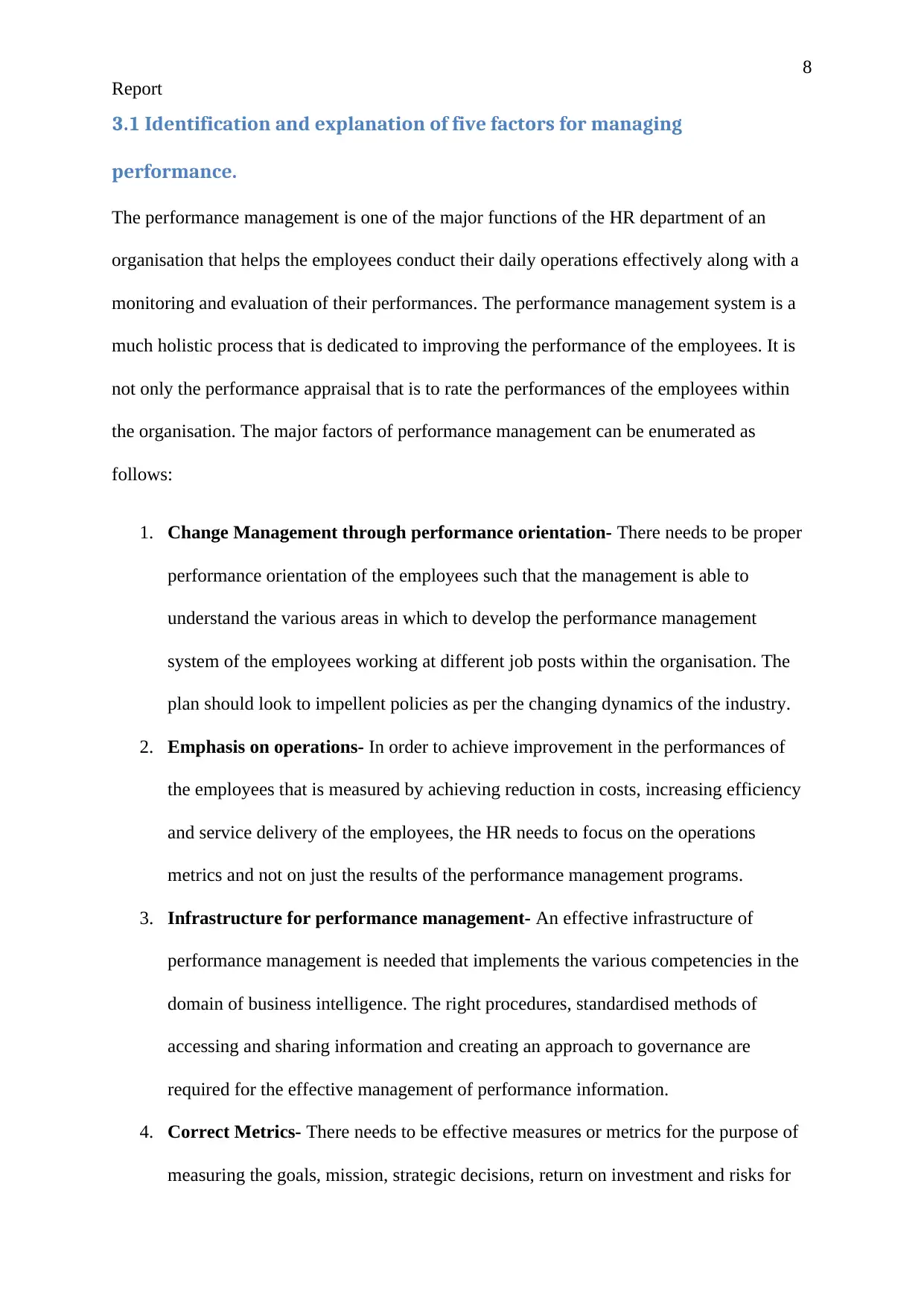
8
Report
3.1 Identification and explanation of five factors for managing
performance.
The performance management is one of the major functions of the HR department of an
organisation that helps the employees conduct their daily operations effectively along with a
monitoring and evaluation of their performances. The performance management system is a
much holistic process that is dedicated to improving the performance of the employees. It is
not only the performance appraisal that is to rate the performances of the employees within
the organisation. The major factors of performance management can be enumerated as
follows:
1. Change Management through performance orientation- There needs to be proper
performance orientation of the employees such that the management is able to
understand the various areas in which to develop the performance management
system of the employees working at different job posts within the organisation. The
plan should look to impellent policies as per the changing dynamics of the industry.
2. Emphasis on operations- In order to achieve improvement in the performances of
the employees that is measured by achieving reduction in costs, increasing efficiency
and service delivery of the employees, the HR needs to focus on the operations
metrics and not on just the results of the performance management programs.
3. Infrastructure for performance management- An effective infrastructure of
performance management is needed that implements the various competencies in the
domain of business intelligence. The right procedures, standardised methods of
accessing and sharing information and creating an approach to governance are
required for the effective management of performance information.
4. Correct Metrics- There needs to be effective measures or metrics for the purpose of
measuring the goals, mission, strategic decisions, return on investment and risks for
Report
3.1 Identification and explanation of five factors for managing
performance.
The performance management is one of the major functions of the HR department of an
organisation that helps the employees conduct their daily operations effectively along with a
monitoring and evaluation of their performances. The performance management system is a
much holistic process that is dedicated to improving the performance of the employees. It is
not only the performance appraisal that is to rate the performances of the employees within
the organisation. The major factors of performance management can be enumerated as
follows:
1. Change Management through performance orientation- There needs to be proper
performance orientation of the employees such that the management is able to
understand the various areas in which to develop the performance management
system of the employees working at different job posts within the organisation. The
plan should look to impellent policies as per the changing dynamics of the industry.
2. Emphasis on operations- In order to achieve improvement in the performances of
the employees that is measured by achieving reduction in costs, increasing efficiency
and service delivery of the employees, the HR needs to focus on the operations
metrics and not on just the results of the performance management programs.
3. Infrastructure for performance management- An effective infrastructure of
performance management is needed that implements the various competencies in the
domain of business intelligence. The right procedures, standardised methods of
accessing and sharing information and creating an approach to governance are
required for the effective management of performance information.
4. Correct Metrics- There needs to be effective measures or metrics for the purpose of
measuring the goals, mission, strategic decisions, return on investment and risks for
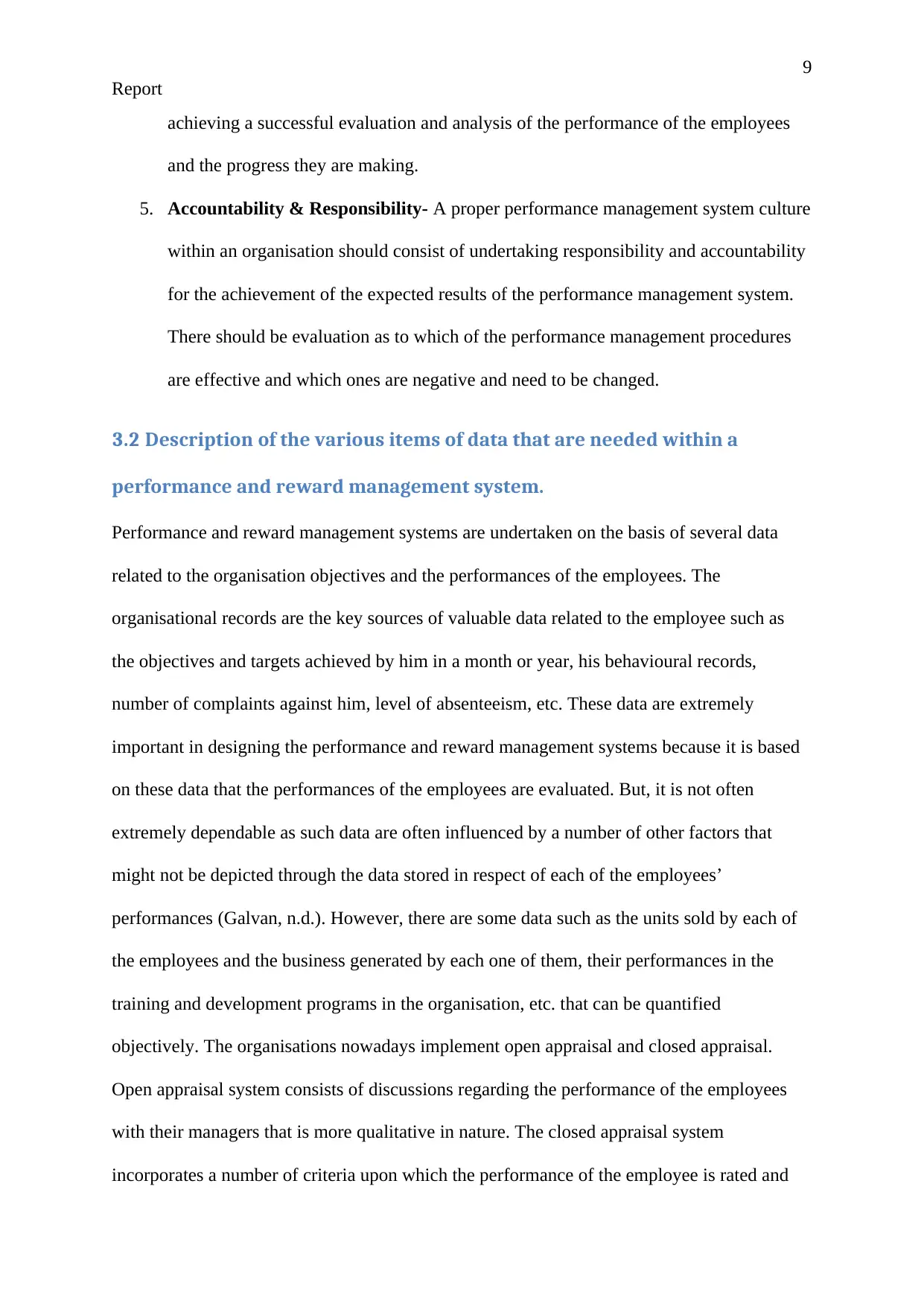
9
Report
achieving a successful evaluation and analysis of the performance of the employees
and the progress they are making.
5. Accountability & Responsibility- A proper performance management system culture
within an organisation should consist of undertaking responsibility and accountability
for the achievement of the expected results of the performance management system.
There should be evaluation as to which of the performance management procedures
are effective and which ones are negative and need to be changed.
3.2 Description of the various items of data that are needed within a
performance and reward management system.
Performance and reward management systems are undertaken on the basis of several data
related to the organisation objectives and the performances of the employees. The
organisational records are the key sources of valuable data related to the employee such as
the objectives and targets achieved by him in a month or year, his behavioural records,
number of complaints against him, level of absenteeism, etc. These data are extremely
important in designing the performance and reward management systems because it is based
on these data that the performances of the employees are evaluated. But, it is not often
extremely dependable as such data are often influenced by a number of other factors that
might not be depicted through the data stored in respect of each of the employees’
performances (Galvan, n.d.). However, there are some data such as the units sold by each of
the employees and the business generated by each one of them, their performances in the
training and development programs in the organisation, etc. that can be quantified
objectively. The organisations nowadays implement open appraisal and closed appraisal.
Open appraisal system consists of discussions regarding the performance of the employees
with their managers that is more qualitative in nature. The closed appraisal system
incorporates a number of criteria upon which the performance of the employee is rated and
Report
achieving a successful evaluation and analysis of the performance of the employees
and the progress they are making.
5. Accountability & Responsibility- A proper performance management system culture
within an organisation should consist of undertaking responsibility and accountability
for the achievement of the expected results of the performance management system.
There should be evaluation as to which of the performance management procedures
are effective and which ones are negative and need to be changed.
3.2 Description of the various items of data that are needed within a
performance and reward management system.
Performance and reward management systems are undertaken on the basis of several data
related to the organisation objectives and the performances of the employees. The
organisational records are the key sources of valuable data related to the employee such as
the objectives and targets achieved by him in a month or year, his behavioural records,
number of complaints against him, level of absenteeism, etc. These data are extremely
important in designing the performance and reward management systems because it is based
on these data that the performances of the employees are evaluated. But, it is not often
extremely dependable as such data are often influenced by a number of other factors that
might not be depicted through the data stored in respect of each of the employees’
performances (Galvan, n.d.). However, there are some data such as the units sold by each of
the employees and the business generated by each one of them, their performances in the
training and development programs in the organisation, etc. that can be quantified
objectively. The organisations nowadays implement open appraisal and closed appraisal.
Open appraisal system consists of discussions regarding the performance of the employees
with their managers that is more qualitative in nature. The closed appraisal system
incorporates a number of criteria upon which the performance of the employee is rated and
⊘ This is a preview!⊘
Do you want full access?
Subscribe today to unlock all pages.

Trusted by 1+ million students worldwide
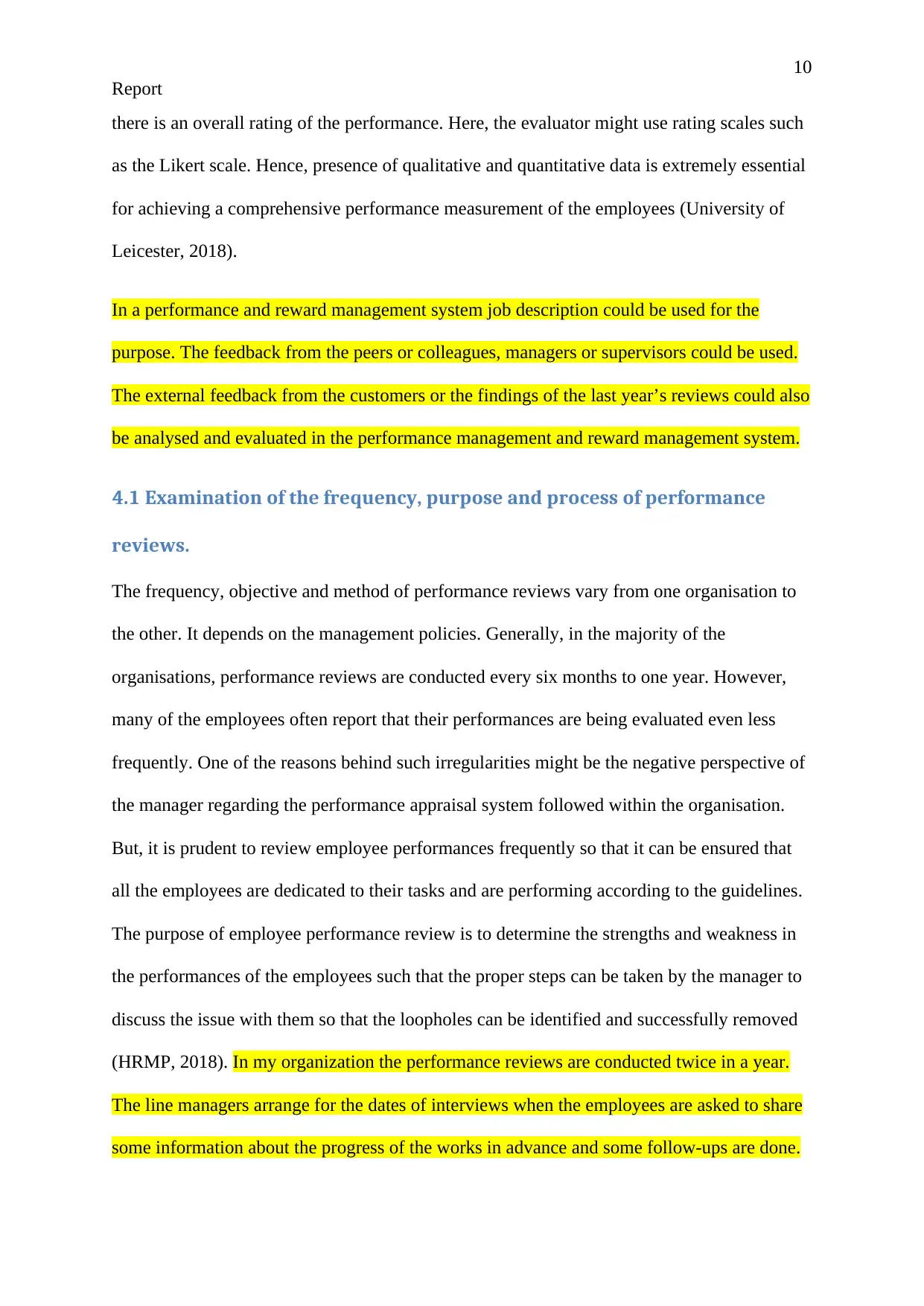
10
Report
there is an overall rating of the performance. Here, the evaluator might use rating scales such
as the Likert scale. Hence, presence of qualitative and quantitative data is extremely essential
for achieving a comprehensive performance measurement of the employees (University of
Leicester, 2018).
In a performance and reward management system job description could be used for the
purpose. The feedback from the peers or colleagues, managers or supervisors could be used.
The external feedback from the customers or the findings of the last year’s reviews could also
be analysed and evaluated in the performance management and reward management system.
4.1 Examination of the frequency, purpose and process of performance
reviews.
The frequency, objective and method of performance reviews vary from one organisation to
the other. It depends on the management policies. Generally, in the majority of the
organisations, performance reviews are conducted every six months to one year. However,
many of the employees often report that their performances are being evaluated even less
frequently. One of the reasons behind such irregularities might be the negative perspective of
the manager regarding the performance appraisal system followed within the organisation.
But, it is prudent to review employee performances frequently so that it can be ensured that
all the employees are dedicated to their tasks and are performing according to the guidelines.
The purpose of employee performance review is to determine the strengths and weakness in
the performances of the employees such that the proper steps can be taken by the manager to
discuss the issue with them so that the loopholes can be identified and successfully removed
(HRMP, 2018). In my organization the performance reviews are conducted twice in a year.
The line managers arrange for the dates of interviews when the employees are asked to share
some information about the progress of the works in advance and some follow-ups are done.
Report
there is an overall rating of the performance. Here, the evaluator might use rating scales such
as the Likert scale. Hence, presence of qualitative and quantitative data is extremely essential
for achieving a comprehensive performance measurement of the employees (University of
Leicester, 2018).
In a performance and reward management system job description could be used for the
purpose. The feedback from the peers or colleagues, managers or supervisors could be used.
The external feedback from the customers or the findings of the last year’s reviews could also
be analysed and evaluated in the performance management and reward management system.
4.1 Examination of the frequency, purpose and process of performance
reviews.
The frequency, objective and method of performance reviews vary from one organisation to
the other. It depends on the management policies. Generally, in the majority of the
organisations, performance reviews are conducted every six months to one year. However,
many of the employees often report that their performances are being evaluated even less
frequently. One of the reasons behind such irregularities might be the negative perspective of
the manager regarding the performance appraisal system followed within the organisation.
But, it is prudent to review employee performances frequently so that it can be ensured that
all the employees are dedicated to their tasks and are performing according to the guidelines.
The purpose of employee performance review is to determine the strengths and weakness in
the performances of the employees such that the proper steps can be taken by the manager to
discuss the issue with them so that the loopholes can be identified and successfully removed
(HRMP, 2018). In my organization the performance reviews are conducted twice in a year.
The line managers arrange for the dates of interviews when the employees are asked to share
some information about the progress of the works in advance and some follow-ups are done.
Paraphrase This Document
Need a fresh take? Get an instant paraphrase of this document with our AI Paraphraser
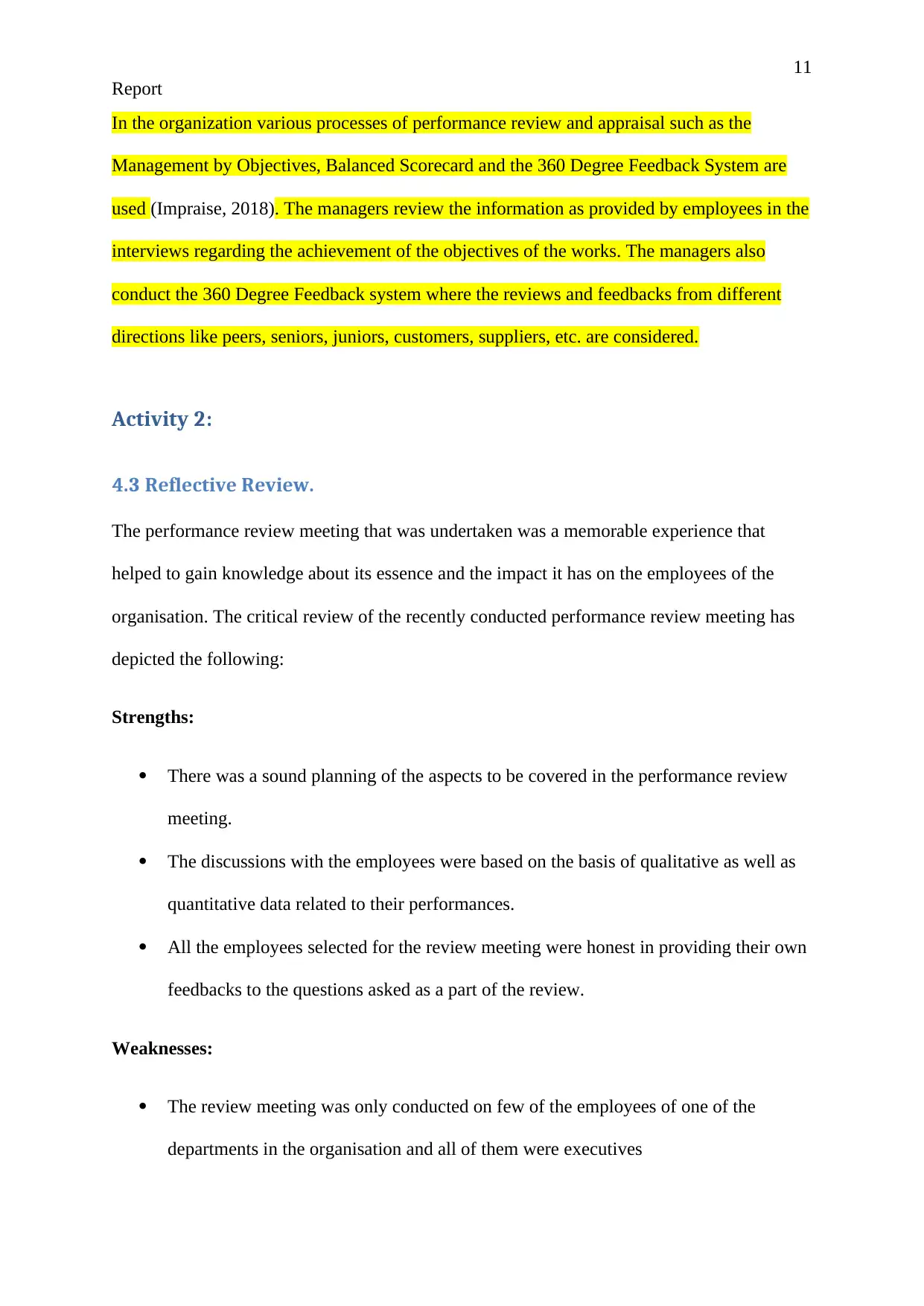
11
Report
In the organization various processes of performance review and appraisal such as the
Management by Objectives, Balanced Scorecard and the 360 Degree Feedback System are
used (Impraise, 2018). The managers review the information as provided by employees in the
interviews regarding the achievement of the objectives of the works. The managers also
conduct the 360 Degree Feedback system where the reviews and feedbacks from different
directions like peers, seniors, juniors, customers, suppliers, etc. are considered.
Activity 2:
4.3 Reflective Review.
The performance review meeting that was undertaken was a memorable experience that
helped to gain knowledge about its essence and the impact it has on the employees of the
organisation. The critical review of the recently conducted performance review meeting has
depicted the following:
Strengths:
There was a sound planning of the aspects to be covered in the performance review
meeting.
The discussions with the employees were based on the basis of qualitative as well as
quantitative data related to their performances.
All the employees selected for the review meeting were honest in providing their own
feedbacks to the questions asked as a part of the review.
Weaknesses:
The review meeting was only conducted on few of the employees of one of the
departments in the organisation and all of them were executives
Report
In the organization various processes of performance review and appraisal such as the
Management by Objectives, Balanced Scorecard and the 360 Degree Feedback System are
used (Impraise, 2018). The managers review the information as provided by employees in the
interviews regarding the achievement of the objectives of the works. The managers also
conduct the 360 Degree Feedback system where the reviews and feedbacks from different
directions like peers, seniors, juniors, customers, suppliers, etc. are considered.
Activity 2:
4.3 Reflective Review.
The performance review meeting that was undertaken was a memorable experience that
helped to gain knowledge about its essence and the impact it has on the employees of the
organisation. The critical review of the recently conducted performance review meeting has
depicted the following:
Strengths:
There was a sound planning of the aspects to be covered in the performance review
meeting.
The discussions with the employees were based on the basis of qualitative as well as
quantitative data related to their performances.
All the employees selected for the review meeting were honest in providing their own
feedbacks to the questions asked as a part of the review.
Weaknesses:
The review meeting was only conducted on few of the employees of one of the
departments in the organisation and all of them were executives
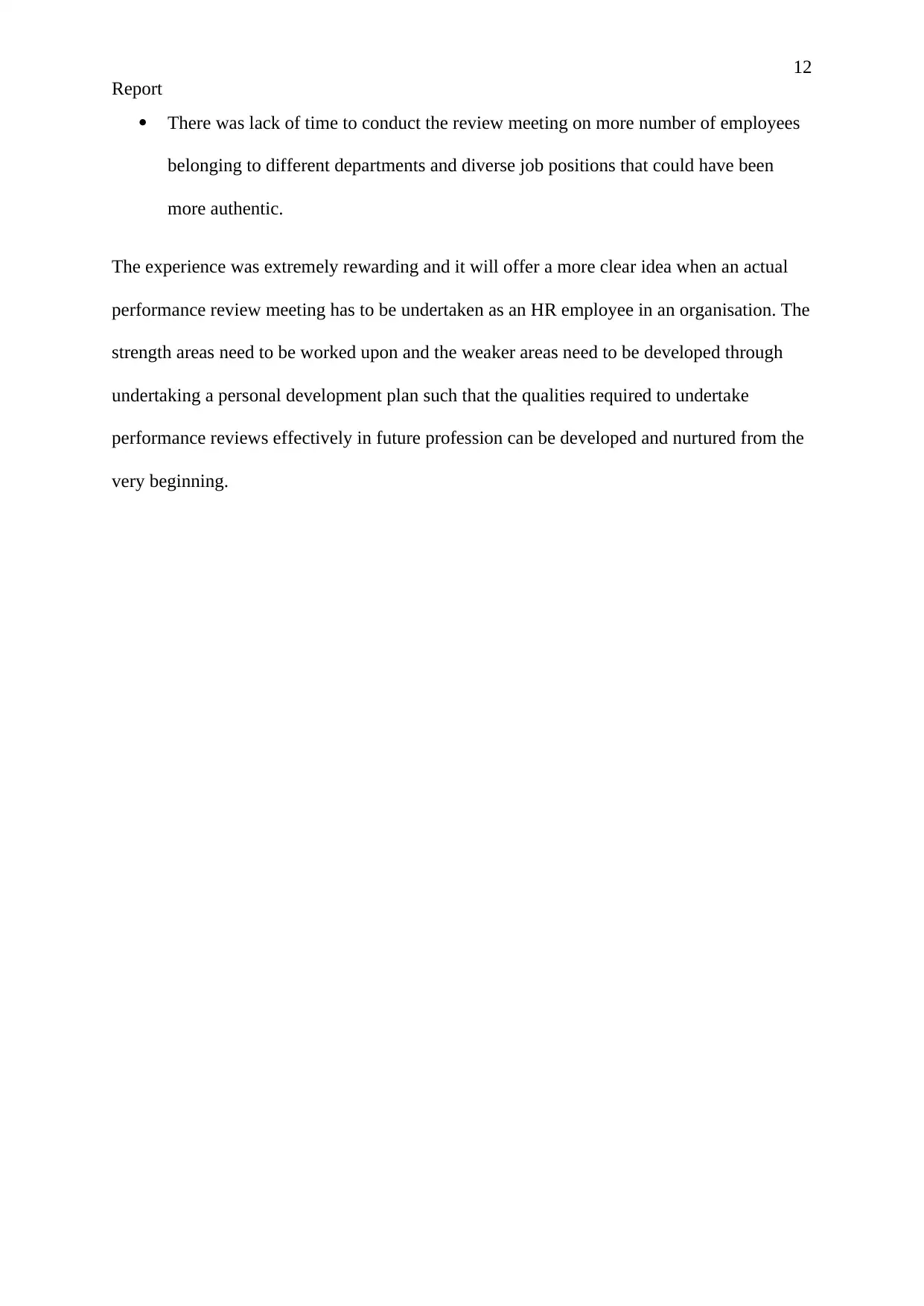
12
Report
There was lack of time to conduct the review meeting on more number of employees
belonging to different departments and diverse job positions that could have been
more authentic.
The experience was extremely rewarding and it will offer a more clear idea when an actual
performance review meeting has to be undertaken as an HR employee in an organisation. The
strength areas need to be worked upon and the weaker areas need to be developed through
undertaking a personal development plan such that the qualities required to undertake
performance reviews effectively in future profession can be developed and nurtured from the
very beginning.
Report
There was lack of time to conduct the review meeting on more number of employees
belonging to different departments and diverse job positions that could have been
more authentic.
The experience was extremely rewarding and it will offer a more clear idea when an actual
performance review meeting has to be undertaken as an HR employee in an organisation. The
strength areas need to be worked upon and the weaker areas need to be developed through
undertaking a personal development plan such that the qualities required to undertake
performance reviews effectively in future profession can be developed and nurtured from the
very beginning.
⊘ This is a preview!⊘
Do you want full access?
Subscribe today to unlock all pages.

Trusted by 1+ million students worldwide
1 out of 14